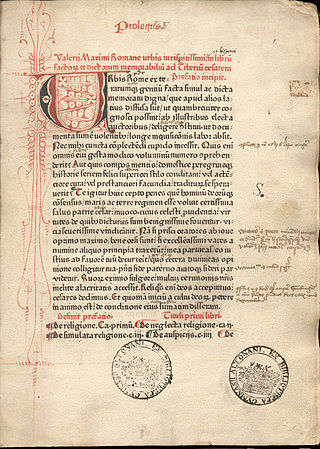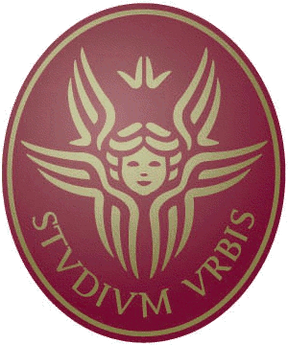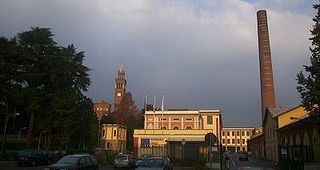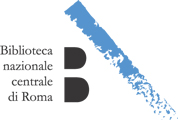
An incunable or incunabulum is a book, pamphlet, or broadside that was printed in the earliest stages of printing in Europe, up to the year 1500. Incunabula were produced before the printing press became widespread on the continent and are distinct from manuscripts, which are documents written by hand. Some authorities on the history of printing include block books from the same time period as incunabula, whereas others limit the term to works printed using movable type.

The Mole Antonelliana is a major landmark building in Turin, Italy, named after its architect, Alessandro Antonelli. A mole in Italian is a building of monumental proportions.

The Sapienza University of Rome, formally the Università degli Studi di Roma "La Sapienza", abbreviated simply as Sapienza ("wisdom"), is a public research university located in Rome, Italy. It was founded in 1303 and is as such one of the world's oldest universities, and with 122,000 students, it is the largest university in Europe. Due to its size, funding, and numerous laboratories and libraries, Sapienza is a major education and research centre in Southern Europe. The university is located mainly in the Città Universitaria, which covers 44 ha near the Tiburtina Station, with different campuses, libraries and laboratories in various locations in Rome.

D'Annunzio University is a public research university located in Chieti and Pescara, neighbouring cities in the region of Abruzzo, Italy. Established in 1960 as a higher education institute and named after writer and poet Gabriele D'Annunzio, it was officially recognised as an independent university in 1965 by Minister Luigi Gui.

The Carlo Cattaneo University is a proprietary, for-profit university located in Castellanza, Italy.

Staffarda Abbey is a Cistercian monastery located near Saluzzo in north-west Italy; it was founded as a daughter house of Tiglieto Abbey in 1135 by Manfred I, Marquis of Saluzzo. The abbey became an important local centre for agriculture and held a flourishing market. It was placed in commendam to the Order of Saints Maurice and Lazarus in 1750.
Biblioteca Nazionale may refer to one of four national libraries in Italy:

The Biblioteca Nazionale Vittorio Emanuele III is a national library of Italy. It occupies the eastern wing of the 18th-century Palazzo Reale in Naples, at 1 Piazza del Plebiscito, and has entrances from piazza Trieste e Trento. It is funded and organised by the Direzione Generale per i Beni Librari and the Ministero per i Beni e le Attività Culturali.

The National Museum of the Italian Risorgimento is the first, the biggest and the most important among the 23 museums in Italy dedicated to the Risorgimento; and the only one which can be considered "national" according to a 1901 law, and due to its rich and great collections. It is housed in the Palazzo Carignano in Turin.
The Esperanto National Library and Archive is the biggest Esperanto library in Italy; it is located in Massa, in northern Tuscany.

The Biblioteca nazionale centrale di Roma, in Rome, is one of two central national libraries of Italy, along with Biblioteca Nazionale Centrale di Firenze in Florence. In total, 9 national libraries exist, out of 46 state libraries.

The Biblioteca Vallicelliana is a library in Rome, Italy. The library is located in the Oratorio dei Filippini complex built by Francesco Borromini in Piazza della Chiesa Nuova.
Italy has 11 national libraries. These include:

The Royal Library of Turin is a library located within the ground floor of the Royal Palace of Turin, itself a World Heritage Site in Turin, Italy.

The Biblioteca Nazionale Braidense or Braidense National Library, usually known as the Biblioteca di Brera, is a public library in Milan, in northern Italy. It is one of the largest libraries in Italy. Initially, it contained large historical and scientific collections before it was charged with the legal deposit of all publications from Milan. Since 1880, it has had the status of a national library and is today one of the 47 Italian State libraries.

Erminia Caudana was an Italian restorer. She was known for her restoration of ancient papyri.
Italy is the home of two of the world's biggest publishers of books in terms of revenue: Messaggerie Italiane and Mondadori Libri. Other large publishers include De Agostini Editore, Feltrinelli and the RCS MediaGroup.
Meraugis de Portlesguez is a late 12th-century or early 13th-century Arthurian romance by Raoul de Houdenc. It consists of 5938 octosyllabic verses. Its protagonist Meraugis also briefly appears as a character in Raoul's La Vengeance Raguidel.














